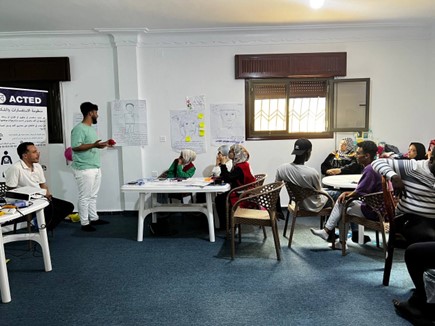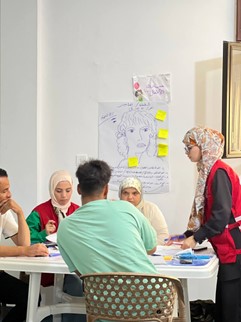In the wake of devastating floods caused by Storm Daniel, Libya faces unprecedented challenges. The natural disasters have left a trail of destruction across the entire North-eastern region of Libya, and especially the city of Derna, sweeping through entire neighbourhoods and leaving infrastructure damaged and livelihoods lost.
In response, Acted, with support from the European humanitarian agency, DG ECHO, initiated a multi-sectoral comprehensive emergency response for 9 months from November 1st 2023 to July 31st 2024. Their proactive approach aimed to deliver essential humanitarian aid, rehabilitate educational facilities, and provide critical services such as child protection, psychosocial support, and educational assistance to the most vulnerable households affected by the floods.
On September 10th, 2023, Storm Daniel wreaked havoc on Libya’s northeast coast, resulting in almost 6,000 deaths and extensive material damage. The natural catastrophe caused two dams to burst, unleashing torrents of muddy water that submerged entire districts of Derna and surrounding areas. The World Bank’s Rapid Damage and Needs Assessment in January 2024 estimated the flood damage and losses to be $1.7 billion, a staggering 3.6% of Libya’s GDP. Overall, Derna was the most affected city, accounting for 19% of all damage and losses. The city was declared a disaster zone and has since then been the focus of intense recovery efforts alongside surrounding regions.
A Comprehensive Program to Heal and Rebuild
Acted’s intervention contributed to holistically address the needs of 8,284 highly vulnerable children, families, and individuals impacted by the floods. The primary focus areas include child protection, psychosocial support (PSS), and Education in Emergencies (EiE). Prioritizing Derna, but not excluding surrounding areas where displaced beneficiaries might relocate, Acted’s strategy was to provide a swift response to emergency protection, PSS needs, capacity building for local actors, and ensure access to education.
Healing Through Play: Recreational and Psychosocial Support Activities for Children
One of the core components of the program was an emergency protection response for 3,963 vulnerable children notably through recreational and psychosocial support activities. Facilitators engaged primary education children in diverse activities designed to foster holistic development. These activities range from movement and sports to cognitive and well-being exercises, all crafted to help children process their trauma and build resilience. Among these facilitators, Duaa, a dedicated volunteer and economics student, emphasizes the significance of culturally sensitive and inclusive activities, ensuring that every child, irrespective of their background, feels embraced and assisted.
For Duaa, “Seeing the children’s increased happiness and attachment to us as facilitators is incredibly rewarding. Their frequent inquiries about future activities show the positive impact we’re having”.
Empowering Educators: Psychological First Aid and Positive Parenting Skills Training
In addition to direct support for children, Acted has implemented several training programs for local actors, including a Psychological First Aid (PFA) training program for teachers, equipping them with the skills to support students’ emotional well-being, long-term. Adam, a Social Specialist at Miftah Almajri School, underscores the profound impact of this training. Nominated to participate, Adam acquired through the PFA program practical tools to better support students experiencing emotional distress.
The PFA training has significantly improved my ability to support students. The skills I’ve gained help create a more supportive and resilient learning environment. These skills have enhanced my ability to support students experiencing emotional difficulties in our daily school environment.
Moreover, the training program offered a wonderful opportunity for Adam to connect and share experiences with colleagues from other schools in Derna. “It was my first time participating in such an exchange, and I hope for similar opportunities in the future.”, Adam remarks.


Parental support is also crucial for a child’s education, particularly in the aftermath of traumatic events like the sudden floods in Derna. Acted recognizes this need and provides guidance on positive parenting strategies to promote a supportive home environment. Facilitators from the organization approach this task in a respectful manner, drawing insights from their observations and interactions with children. Equipping parents with practical strategies to support their children’s emotional well-being has proven highly beneficial. Muhammad, a facilitator with experience working with families, recalls that discussions on stress relief techniques deeply resonated with parents: “Relaxation exercises are particularly well-received as a way to manage post-traumatic stress. Parents often experience changes in behaviour due to trauma. This can lead to uncontrollable anger and, in some cases, resorting to violent punishment towards children. Positive parenting sessions offer significant benefits to families. Continued support through training programs equips families with positive skills and behaviours to navigate daily challenges. This support should be ongoing…”.
Rebuilding Educational Infrastructure
Acted’s commitment in Derna extends to the rehabilitation of educational facilities. This includes basic repairs, provision of classrooms materials and improvements of water, sanitation and hygiene (WASH) facilities to six schools. These initiatives were guided by an Education in Emergency Assessment in consultations with local communities, ensuring that interventions address the specific needs of the affected areas.
Overall, Acted’s comprehensive response in Derna goes beyond immediate relief, focusing on laying the grounds for long-term recovery and resilience. Through critical psychosocial support and education services, Acted is dedicated to aiding children and their families in rebuilding their lives and futures. The positive impacts of these activities are evident in the increased happiness of children and the enhanced capabilities of local educators.
As Derna progresses on its path to recovery, Acted and its partners’’ initiatives will create a lasting impact, ensuring robust support for the most vulnerable populations and fostering a community that emerges stronger and more resilient than before.


